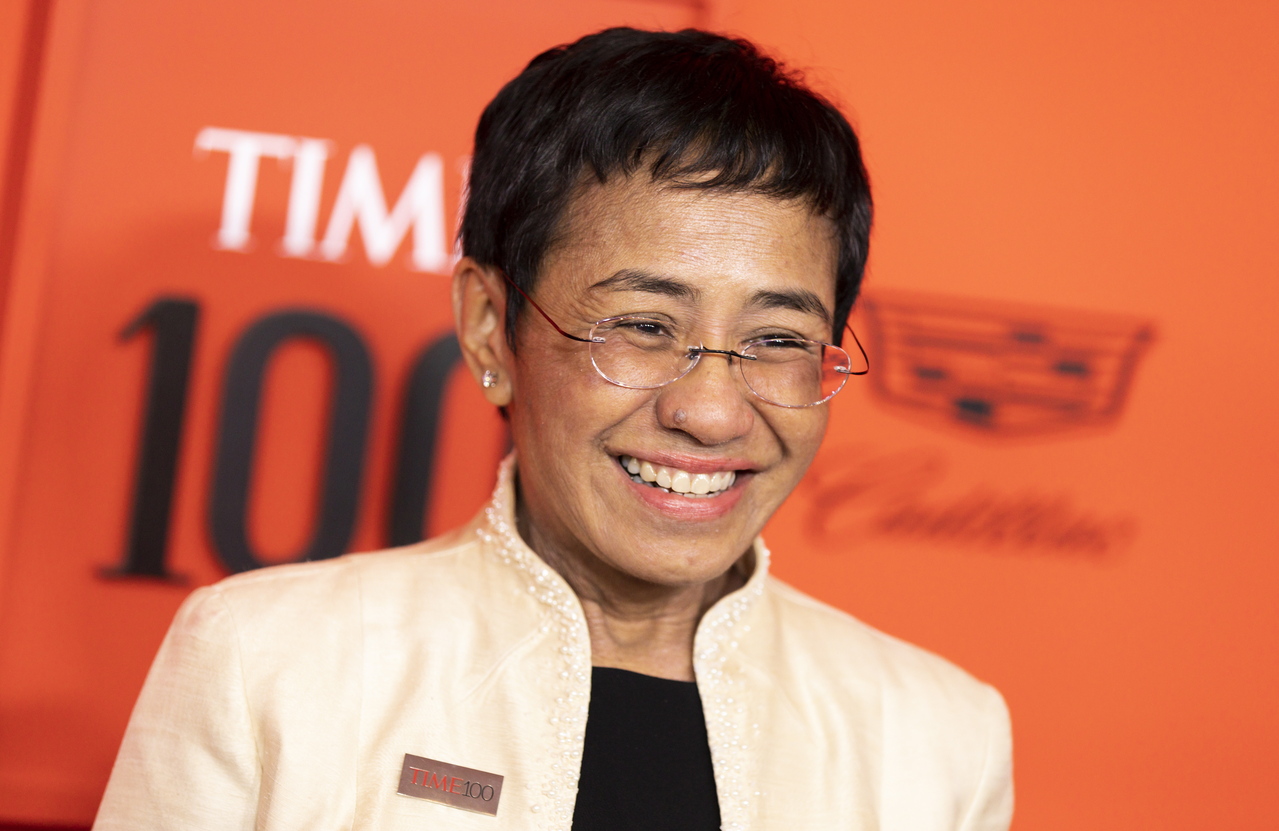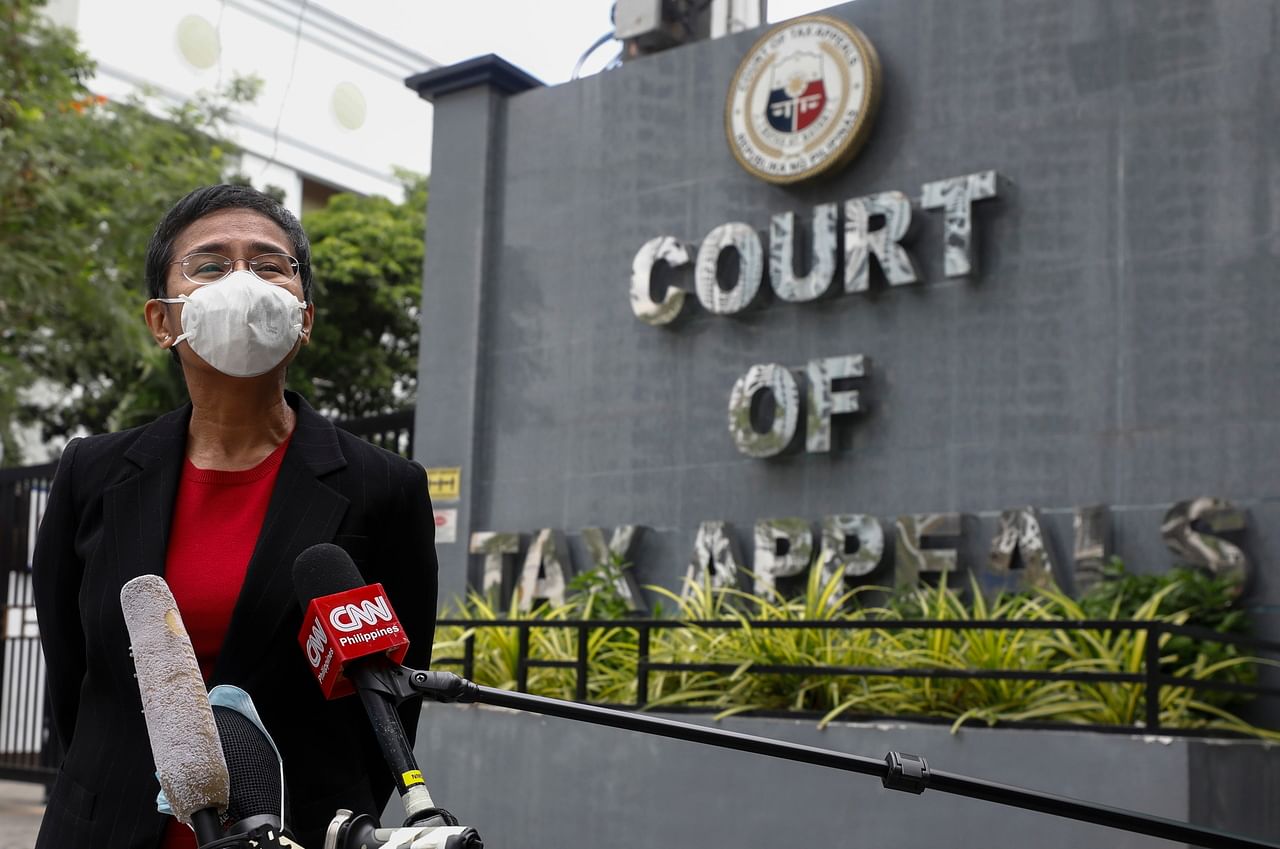Philippines' Nobel Prize winner Maria Ressa says 'nothing is possible without facts'
Sign up now: Get insights on Asia's fast-moving developments

Maria Ressa and Rappler have faced multiple criminal charges and investigations after publishing stories critical of Duterte's policies.
PHOTO: EPA-EFE
MANILA (AFP) - Veteran Philippine journalist Maria Ressa said on Friday (Oct 8) that her Nobel Peace Prize win shows that "nothing is possible without facts", as she referred to the links between democracy and freedom of expression.
"A world without facts means a world without truth and trust," Ms Ressa said during a live-streamed interview with her news website Rappler.
The outspoken critic of President Rodrigo Duterte expressed "shock" at the award and said Rappler, the news outlet she co-founded, "would just keep doing what we're doing".
"I'm speechless, thank you so very much," Ms Ressa said when called by Mr Olav Njoelstad, Secretary of the Norwegian Nobel Committee, minutes before the 0900 GMT (5pm Singapore time) announcement of the prize. A recording of the conversation was later released by the award-giving body.
Ms Ressa, 58, shares the award with Russian journalist Dmitry Muratov, 59.
Ms Ressa and Rappler have faced multiple criminal charges and investigations after publishing stories critical of Mr Duterte's policies, including his bloody drug war.
The former CNN correspondent is on bail pending an appeal against a conviction last year in a cyber libel case, for which she faces up to six years in prison.
Two other cyber libel cases were dismissed earlier this year.
"In less than two years, the Philippine government filed 10 arrest warrants against me - it was pretty bleak at different times," Ms Ressa said.
Still, she was defiant in her defence of her battle for freedom of expression and independent journalism.
"This is the best time to be a journalist," Ms Ressa said as she smiled. "The times when it's most dangerous are the times when it's most important."
In April, the United Nations' cultural agency awarded its annual press freedom prize to Ms Ressa in recognition of her "unerring fight for freedom of expression".
"We need to continue shining the light," she said. "We need to continue doing accountability journalism."
Ms Ressa has become a symbol of the fight for press freedom in an era of strongmen leaders.
The former CNN bureau chief set up news website Rappler in 2012, bringing together multimedia reporting and social media to offer an edgy take on Philippine current events and a critical eye on the government of President Duterte.
Ms Ressa had already been named a Time Person of the Year in 2018 for her work on press freedom, but the arrests further grew her international profile and drew more attention to her case.
Her reporting has unleashed what media advocates say is a grinding series of criminal charges, two arrests and a deluge of online threats against her and Rappler.
The website has had to fight for survival as Mr Duterte's government accused it of violating a constitutional ban on foreign ownership in securing funding, as well as libel and tax evasion.
Mr Duterte has attacked Rappler by name, calling it a "fake news outlet", over a story about one of his closest aides.
Though the government has said that it has nothing to do with any of the cases against Ms Ressa, press freedom advocates disagree.
Yet through the campaign against her, Ms Ressa has remained based in the Philippines and continued to speak out against Mr Duterte's government despite the risks.
"I'm not a sole reporter," Ms Ressa told AFP in an interview last year. "My job is to hold up the ceiling, it has been for a while... so that our folks can continue working."
'Shot at and threatened'

<p>epa09512696 (FILE) - Maria Ressa, Chief Executive Officer (CEO) and Executive Editor of online news site Rappler, speaks to the media outside the Court of Tax Appeals in Quezon City, Metro Manila, Philippines, 04 March 2021 (reissued 08 October 2021). Maria Ressa and Dmitry Muratov were announced 2021 Nobel Peace Prize laureate by the Nobel Committee in Oslo on 08 October 2021. EPA-EFE/ROLEX DELA PENA</p>
PHOTO: EPA
The most recent case saw a second libel charge against Ms Ressa dismissed in August. Another libel charge against her was dismissed in June.
Ms Ressa's position at the head of the Rappler news site meant getting, by her own estimate, up to 90 abusive messages per hour online at one point towards the end of 2016.
The threats came in the months after Mr Duterte took power and launched his narcotics crackdown that has killed thousands.
Rappler was among the domestic and foreign outlets that published shocking images of the killings and questioned its legal basis.
But Ms Ressa's arrests would not come until early 2019.
The first was in February and was over the libel case, then a second one less than two months later on allegations Rappler violated laws barring foreign ownership of media.
Due to the string of libel and tax cases against her and Rappler, Ms Ressa says she had to post bail eight times in the span of about three months.
It was an entirely new set of threats for Ms Ressa, who was a veteran of conflict zones before co-founding Rappler.
"I began as a reporter in 1986 and I have worked in so many countries around the world, I have been shot at and threatened, but never this kind of death by a thousand cuts," Ms Ressa said.
As CNN's former bureau chief in Manila and Jakarta, Ms Ressa specialised in terrorism where she tracked the links between global networks like Al-Qaeda and militants in South-east Asia.
The Princeton graduate, who holds both American and Philippine citizenship, later returned to the Philippines to serve as news chief at the nation's top broadcaster ABS-CBN.


